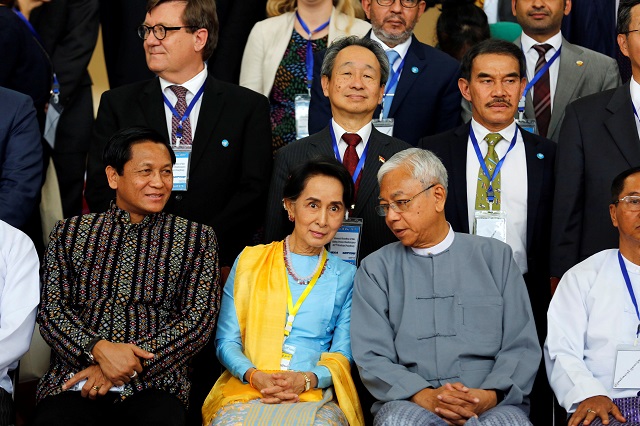
The discussions are the de facto leader's second attempt to end conflict in the country's troubled frontier regions, where various ethnic groups have been waging war against the state for almost seven decades.
A sea of colour filled the vast conference hall in Naypyidaw on Wednesday morning as ethnic delegates in traditional costumes mingled with stony-faced military officers decked out in full regalia.
Addressing the assembled crowd, Nobel laureate Suu Kyi sought to dismiss criticism that little progress has been made on her flagship policy more than a year after her party took power. "Our collective efforts have started to bear fruit," she said, according to an official translation of the speech.
"We have now reached the stage where we are able to discuss the basic federal principles that are so important for our country." Hopes had been high that Myanmar's first freely elected government in generations would end the running conflicts that have claimed thousands of lives and kept the country mired in poverty.
Two killed while making landmine in Myanmar's Rakhine
But many ethnic groups say Suu Kyi has not listened to their concerns and is working too closely with the military, which ran the country with an iron fist for almost half a century. None are expected to sign up to the National Ceasefire Agreement she is pushing during the conference - a controversial deal first touted by the previous military-backed government.
The agenda will cover what shape a federal union might take, and is expected to include the first discussions on whether states will be able to draft their own constitutions. "In a way, it is a historic milestone in the post-colonial history of Myanmar and represents a new level of federalism," said Angshuman Choudhury from the Institute of Peace and Conflict Studies.
"It is a strategic move by the union government to appease powerful ethnic constituencies and... prevent outright secessionism." The talks come as violence in Myanmar's northeast has reached its worst point since the conflict-ridden 1980s.
Tens of thousands of people have been forced to flee months of heavy fighting between the army and insurgent groups, many of them crossing into neighbouring China.
Pope's meeting with Myanmar's Suu Kyi leads to diplomatic ties
"We are hoping to be able to hold political discussions and talk directly about stopping the fighting and offensives by the Myanmar military," Major Tar Pan La from the the Ta'ang National Liberation Army (TNLA) told AFP. As the talks got underway the EU's Myanmar mission released a statement urging all parties to "put an end to conflict".
The violence has destroyed much of the fragile trust that minority voters placed in Suu Kyi in the 2015 vote, and her National League for Democracy (NLD) suffered several embarrassing losses in recent by-elections.
It has also strengthened the hand of the China-backed United Wa States Army (UWSA), Myanmar's biggest ethnic armed group, which is widely considered to be one of the world's top drug traffickers. The 25,000-strong militia has brought together several groups still locked in combat with the military into a new negotiating bloc that is refusing to sign up to the government-backed ceasefire.
Representatives from all seven, including the Kachin Independence Army (KIA), the Myanmar National Democratic Alliance Army (MNDAA) and the Arakan Army (AA), touched down in Naypyidaw on Tuesday after weeks of fraught politicking.
In a gesture of goodwill, the president late on Tuesday announced an amnesty for more than 250 foreign and Myanmar prisoners. But analysts say all sides face a difficult task ahead of them.
The most important thing in the current situation is to be able to hold a meaningful conference," said ethnic affairs analyst Mg Mg Soe.
"We cannot say it is a successful meeting if we do not get any agreement."

1730360426-0/Menendez-Brothers-(2)1730360426-0-165x106.webp)
1732534556-0/taylor-(14)1732534556-0-165x106.webp)
1725872216-0/Tribune-Pic-(3)1725872216-0-165x106.webp)
1732532771-0/BeFunky-collage-(89)1732532771-0-165x106.webp)
1732518687-0/Copy-of-Untitled-(78)1732518687-0-270x192.webp)











COMMENTS
Comments are moderated and generally will be posted if they are on-topic and not abusive.
For more information, please see our Comments FAQ